
Greedy Cherry’s Michael Conrad: “It really took the quarantine and isolation at home during COVID for me to have the time to sit down, pull out the old hard drives, and start to go through the songs and fill in the blanks”
From Berklee to Nashville and beyond, Michael Conrad reflects on the journey and creative process behind his new musical project
Greedy Cherry is a musical project that represents the creative brainchild of singer, songwriter, and bass player Michael Conrad. With a Steely Dan-influenced mindset, he focuses on creating the best possible songs and bringing in talented musicians to contribute to each one. With a diverse range of musical influences and genres, each of Greedy Cherry’s songs is a unique representation of Michael’s inspirations and passions.
After more than a decade in the making, Greedy Cherry’s debut album Bada Bing is finally here. The album’s recording sessions began in 2008, just after Conrad graduated from Berklee College Of Music. However, the economic downturn that year took all the money that had been saved for the project, causing significant delays. It wasn’t until he moved to Nashville and the pandemic hit that Conrad had the opportunity to refocus on the half-completed album and collaborate with other musicians who were also home-bound due to the pandemic.
Bada Bing features an impressive lineup of artists, including reggae guitarist Wendel “Junior Jazz” Ferraro from Inner Circle and Monty Alexander, vocalist Kyle Patrick from The Click Five, and members of the Grammy-nominated all-female bluegrass band Della Mae.
In this exclusive interview, we get an insight into the inspiration and creativity behind Michael’s musical project. From his earliest memories of music to the challenges he faced in completing his debut, we explore his fascinating journey…
Click here for more interviews
Take us right back to your earliest memory of music.
“Probably sitting at the kitchen table when I was in grade school, eating my breakfast while listening to songs from a local AM station playing on the radio. The music was mainly oldies and easy listening, but it made an impact. I still remember hearing Gordon Lightfoot’s Wreck Of The Edmund Fitzgerald and feeling very sad while listening to the lyrics, wondering if all of those people had really been swallowed by the sea. It was almost enough to ruin my bowl of oatmeal.”
And how did that progress into making music?
“I remember that, back in elementary school, we were only first given the option of signing up for band and playing an instrument in the fourth grade. I really wanted to play drums, but for some reason they made you wait to join the band until fifth grade if you chose that. So I chose trombone instead, as that was what my father played when he was in school, and we still had his instrument in the house for me to use. The first songs I ever played were staggeringly simple (Hot Cross Buns, anyone?), but I really enjoyed that feeling of creating music and playing in an ensemble with others – combining the sounds from our individual instruments to make something bigger and more impactful.”
What first inspired you to write a song?
“That’s a great question, but I’m not sure I have a specific answer for it. I’ve just always loved music, listening to and being moved by songs, and at some point, I think I just said to myself, ‘Why couldn’t you write one of those things?’ I can say with 100 percent certainty, however, that there were a lot of horribly bad ones in the beginning, but I’d like to think I got a majority of those out of my system early on. Then again, I’d also like to think that I’m not lying to myself when I think that.”
Who were you listening to back then and how did they influence your writing?
“I’m someone who really has always loved so many different types of music, and I find myself drawn to people who are eclectic in what they write and play and wear those influences on their sleeves. I think early on I took notice of how bands like The Beatles and Led Zeppelin wouldn’t work in just one style or genre, but rather try whatever came to their minds, expanding their boundaries and purposefully pushing their limits with every new album. Just between those two bands, you can hear everything from gentle acoustic pieces to hard rockers, spacey jams to blues and soul-influenced songs, and even orchestras and elements of Indian classical music. Being able to tap into such a wide variety of genres is like being a painter and having a palette with thousands of colours on it, all available to use whenever the particular mood strikes to enhance and enrich your work.
“Of course, that’s answering the question from mostly a music-based angle. As far as lyric writing, I have a great appreciation for people who have both the language skills and emotional awareness to describe the realities of life to you in subtle yet devastating ways that had never occurred to you to put into words. People like Bruce Springsteen or John Mellencamp can write a lyric that just rips your guts out because they lay truths – often painful truths – about life bare. You don’t hear them with your ears, you hear them with your heart.
“But I also appreciate socially and politically aware lyrics, when they are not too on the nose or over the top. Gil Scott-Heron was one of the greatest poets to ever put social commentary to music, and his writing was always just as sharp as his vocal delivery. And I still think one of my favourite lyrics of all time is from Have A Cigar by Pink Floyd, where Roger Waters describes greedy record company executives salivating over the signing of a big artist with the cutting line, ‘We’re so happy we can hardly count.’”
You went to Berklee College Of Music. What did you learn there, in terms of songwriting?
“Berklee didn’t really affect my songwriting in regards to the process I ordinarily use to create my ‘standard’ type of song, but, with all the classes in composition and having to play different styles of music in various ensembles, it certainly did open up my horizons a bit in regards to the genres I was tackling when writing. For instance, I took a composition class where I ended up writing my first jazz tune (which ended up being the second track on my album, Bossa Mysterioso), and another where I wrote a classical piece. In addition, being a performance major, I played bass guitar in a number of ensembles in a variety of styles, which widened my palette and opened my ears further. So, through those experiences, my goal gradually became to take all of these many interests and influences and make an album where every song was written in a different genre – and that’s what I tried to do with Bada Bing!”
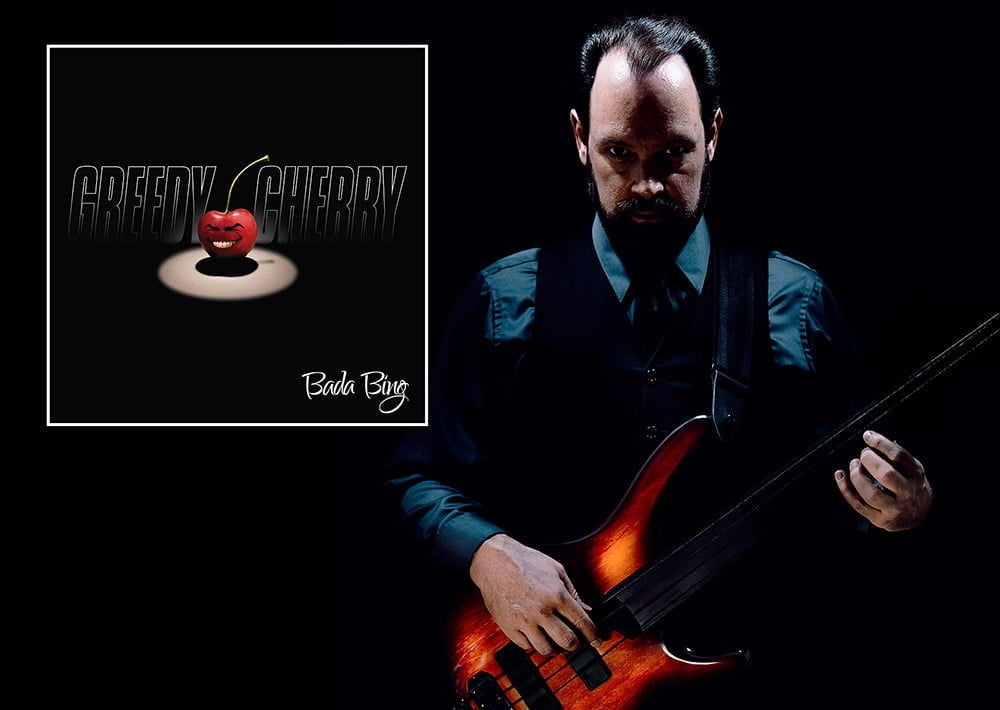
Greedy Cherry AKA Michael Conrad: “Be open to new music, new people, and new points of view – every new experience is another colour in the palette that you get to paint with.”
Then you moved to Nashville. Did being there affect your writing at all?
“To be honest, most of the album was already written and recorded by the time I left Boston. I had a number of sessions during the summer of 2008 where we had recorded most of the parts for 10 different songs, but there were some pieces left unfinished – for instance, I Cried For You was mostly complete, but I still needed to add the string section to finish the piece. Unfortunately, the economic downturn hit that year, and I had to break off the recording sessions and use all my money just to pay rent and buy food. It took a number of years and a switch in careers before I started to get back on my feet. And it really took the quarantine and isolation at home during COVID for me to have the time to sit down, pull out the old hard drives, and start to go through the songs and fill in the blanks. A lot of musicians were also trapped at home during the pandemic, and so I felt it could be a good time to reach out and try to get some wonderful players to guest on the record who might have ordinarily been busy.
“That was the case, for instance, with a few of the members of all-female, Grammy-nominated bluegrass group Della Mae. I had written We Don’t Live Here Anymore after moving to Nashville (the only song on the album written after the move, inspired by a lonely little house I drove by one day), and knew I wanted it to be an authentic-sounding bluegrass song. But I also knew I’d need some professionals in order to make it sound right. I was familiar with Della Mae from my years in Boston (they formed in Boston while I lived there), so I reached out to their management to inquire about the possibility, and, luckily, they were up for it! So you could argue that the change in location affected – in a very positive way – my ability to actually complete the album much more than it did my writing of songs for it. Although I suppose one could argue that writing a bluegrass song after moving to Nashville could indeed be related to your question!”
Too much of a coincidence! So how did you go about choosing who to collaborate with?
“The main core of collaborators were actually a few of my classmates and friends from Berklee – not only great people to know on a personal level, but extremely talented as well. There’s a level of comfort that comes from entrusting your compositions to great players that you have an existing relationship with, and these tracks owe a good deal of what they are and how they sound to the amazing work of those fine friends.
“Outside of that core group of folks, I wanted to fall back on the ‘theme’ I had set up in my head for this particular musical project. I’m a huge fan of Steely Dan, and it really resonated with me the way they would put such effort into writing the best songs they could, and then would hire the best session players they could get their hands on to make those tracks all that they could be. So Greedy Cherry became not so much an actual group of consistent musicians, but more of a vehicle for my songwriting with a rotating cast of players.
“Therefore, my goal when selecting session musicians became either to find players who were well-versed in that particular song’s style, or to find established artists in that style whose music I enjoyed and who I thought it would be fun to work with. The members of Della Mae would an example of this latter category, as would Kyle Patrick, a former Berklee student himself, who was the lead singer of the award-winning power pop group The Click Five. I was lucky enough to have him to add some co-lead vocals and harmonies on Baby, You’re The One. And some collaborators just came by way of recommendations: through a Berklee classmate, I got hooked up with Wendel ‘Junior Jazz’ Ferraro – who has played with Inner Circle and Monty Alexander – and he put some tasty guitar work on my reggae song Lion’s Den. I also reached out to a few Boston-based jazz players (including a couple of instructors at Berklee) for Bossa Mysterioso.”
Was the eclectic nature of the album a conscious decision, or did the diverse collection of songs come together organically?
“Short answer: a conscious decision. As long as I can remember, I’ve really loved listening to all different kinds of music – I’ve never really been a ‘rock guy’ or a ‘country guy’ or limited myself to just one particular genre. I mean, why limit yourself to just eating Italian food every day when there are so many other different kinds of foods out there to experience, right? But while I always had those various musical influences floating around in my head while writing my songs, I didn’t really come up with the concrete idea of writing a bunch of individual songs in completely different genres and bringing them all together on one album until my years at Berklee. I thought it would be the best way to make a record that actually represented who I was as a music lover.”
What feeds your creativity? Where do you draw your inspiration?
“This one’s easy! I’m inspired to create music because of music. Music is the soundtrack of our lives, and there are very few places or relationships or events in my life that I don’t associate with a particular song or a particular artist’s catalogue. Whether it is the music itself that generates a mood or feeling, or the lyrics that speak to an important moment or relationship in your life, songs are ever-present. And there are so many different genres and styles to absorb and be inspired by! Every culture and generation has its own sound, and I often feel like a kid in a candy store – there’s so much to hear out there in the world! The sources of inspiration are truly endless.”
Absolutely! Speaking of which, you sing and play bass, but do you use any other instruments to write and spark inspiration?
“The main instrument I use to write songs is actually my acoustic guitar. Surprisingly, even though I’m a bass player, I very rarely use the bass to write – although I did create the song No Excuse by coming up with the main bass lick first. Also, every once in a while I’ll use a keyboard to flesh an idea out, but that is rare as well, as I am not exactly Elton John when it comes to playing that particular instrument.”
What tends to come first: melody, chords, lyrics, title, concept?
“This is one of my favourite questions to see asked of musicians, because it seems that no matter how they start or end up answering it, the ultimate result essentially always boils down to the words ‘it depends’. I personally find that you can never really tell how a song is going to enter your head. Sometimes I’ll be playing the guitar and will strum a certain progression or will come up with a little lick that strikes me as a good springboard for a song. Other times, I might be having a conversation with someone and one of us will say something interesting, and I will make a note of that special phrase to use for a lyric. No Excuse came from practising my bass one day and hitting upon that main lick. From there, I fleshed out how a whole band might groove around that bass line with a quick demo in Garageband, and then came up with a story that felt right with the music and wrote some lyrics later. We Don’t Live Here Anymore, on the other hand, came about as I drove by an abandoned home and started thinking about who might have lived there long ago and what they might tell me about that house if we could chat. The title hit me almost immediately, and some lines of lyric started pouring out of my head shortly thereafter; the music was created much later.
“So, yes, it depends. Little bits of music or lyric usually come to me randomly, and I quickly write them down or make a brief voice recording on my phone. And later I will either match my new music to a previously created lyric, or perhaps my new lyric to previously created music. Or maybe I’d start trying to do one of those things and somehow it would all go sideways and I’d end up coming up with something else entirely! Ultimately, however the universe decides to gift me a song, I’m here for it.”
I guess that means you’ve always got a pool of ideas to draw from, but do you ever suffer from writer’s block?
“It’s funny that when people talk about writer’s block, they’re usually talking about words and lyrics, but I find that, for me, it happens musically just as often. I’ll be trying to write a good chord progression, and I’ll get three or four chords in and suddenly I can’t find the next chord I want. I might know sort of what I’d like the song to sound like, or how I want things to move, but I just can’t seem to land the exact chord that sounds right to me. Super frustrating, and something where I sort of have to hum a few things that I think should come next and then slowly build the chord I want out of that.
“Lyrically, however, I write in a very strange way. I don’t know if I can blame it on OCD or not, but I don’t like having messy lyric sheets, hard-to-read scribbles, things crossed out, words written up the sides and in the corners… I like my lyric sheets neat, mostly because while I’m working, it’s clear to me where I’m at in the process and what I’ve already said… and then, when I’m done, I can just simply sing from what I’ve written. But, because of this, I’ll find that I will often write lyrics a few lines at a time, spacing things out on the piece of paper, and filling in the ‘puzzle pieces’ as they come to me. For instance, I might get a couple lines of an introductory verse and part of a chorus, so I’ll put the first verse at the top of the sheet, skip down a number of lines, and then write the chorus bit. And then I’ll try to think of the rest of the chorus, or a second verse that works. Sometimes I’ll sit there for a little while trying to make it work, sometimes I just walk away and come back to it days or weeks later. I’ve often found that just letting your subconscious mull things over while you are going about other activities in your life is the best way to have all the dots connect correctly. But even if something pops into my head, I usually won’t write anything down on that lyric sheet until I’ve run it over a few times in my head, sung it with the guitar, and am sure it works in that particular spot. Then I grab my pen.”
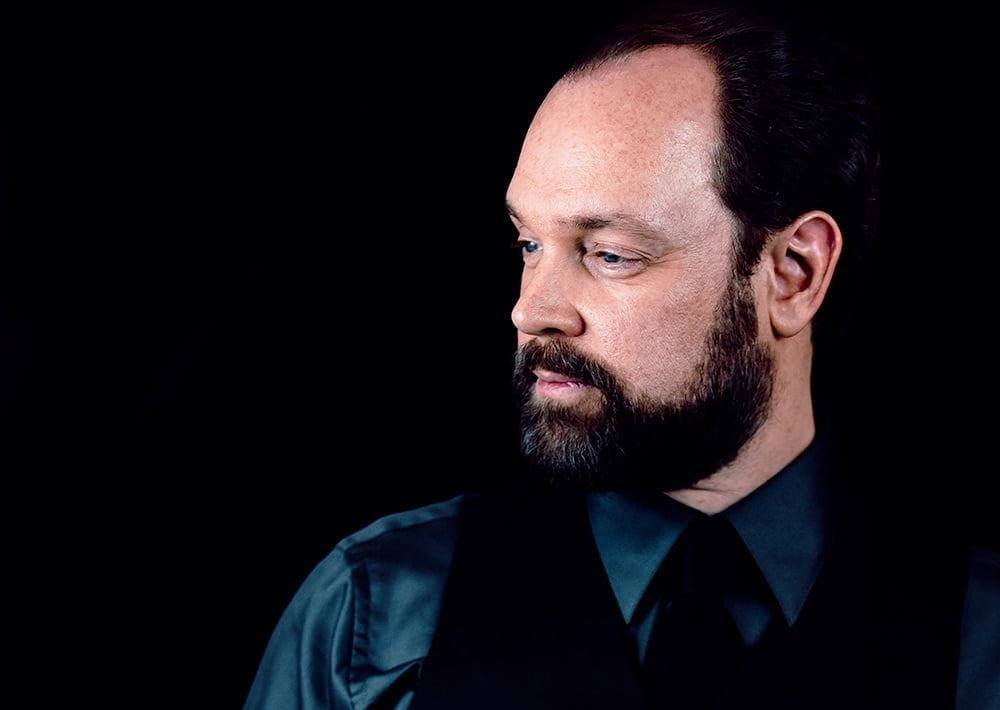
Michael Conrad: “Greedy Cherry became not so much an actual group of consistent musicians, but more of a vehicle for my songwriting with a rotating cast of players”
What advice would you give to other songwriters out there?
“Always be true to what you want to say, musically, of course, but especially lyrically. It’s my personal opinion that when you write a song, you do so – in a way – for two different audiences: the music is for the potential listener, and the lyrics are for you. Lyrically, each person has a unique perspective and voice to share with the world, and, even if you are telling a story or describing a situation that someone has already written about before, you will always do it in a way that is distinctly yours, either in word choice, phrasing, or meter. If you have something to say, say it honestly and in just the way you feel. Write in a way that resonates with you, because often there are others out there like you who are feeling something that they can’t put into words, and you can do that for them (and gain fans) just by honestly expressing yourself. So be uncompromising and truthful and say exactly what you want to say – your message is yours.
“But the reason I say what I do about the music is this: while you ultimately decide what style of music you want to play and the melody and instrumentation of a song when you write it – and while you, of course, want to write music that appeals to your ear and that you enjoy listening to – I also believe that, to a certain degree, you are writing with an idea of what type of person or audience you would like to have listening to your music and what they might like to hear. And I believe that it’s good to cater to that a bit and strive to make the most pleasing music you can for your fans (or potential fans). You really want to create a tune that catches people’s ears and gives them something great to listen to or vibe with. When a song comes on, people don’t have to hear a word you’re singing to know whether or not the music speaks to them and if they want to listen further. The music you write can get you a new fan immediately or, conversely, cause them to skip to the next track.
“I think the power of music becomes even more important if you have a message you want people to hear in your lyrics, because your music is the vehicle that carries those words to their ears. You could be writing down the secrets of the universe, but if you want jazz fans, for instance, to hear that message, don’t put it in a death metal song. Or in a badly-written jazz song, for that matter. Musically, you want to create the best song you possibly can in that particular genre; something familiar and unique all at the same time, with a strong melody and good harmonic elements. That is, unless you are aiming your release at people who love atonal music, of course…then ignore most of what I just said.
“Ultimately, just be open to what the universe gives you. Be open to new music, new people, and new points of view – every new experience is another colour in the palette that you get to paint with. And there are no songs quite like kaleidoscopic songs!”

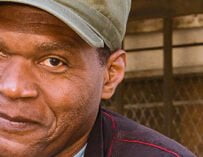
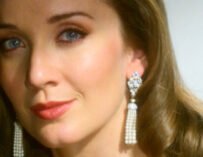



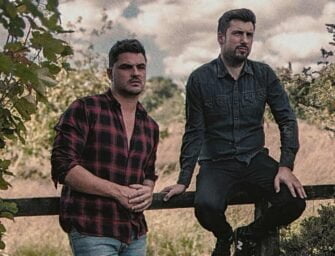

![Songwriting Credits… best new music playlist [September 2023]](https://www.songwritingmagazine.co.uk/wp-content/uploads/songwriting-credits-september-2023-335x256.jpg)






























Related Articles